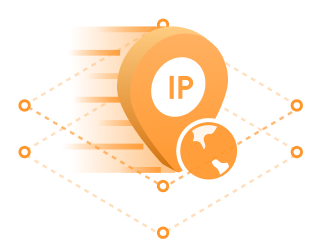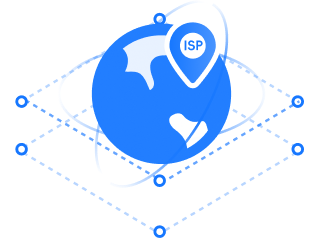In the internet age, proxy servers play a crucial role in network usage, especially when conducting cross-border business or needing to hide one's true IP address. Among the many different types of proxy servers, ISP proxies, as a special type, have garnered significant attention. So, what exactly is an ISP proxy, and how does it differ from other types of proxies?
Definition of ISP Proxy
An ISP proxy refers to the proxy service provided by an Internet Service Provider (ISP). This type of proxy service typically consists of real user IP addresses allocated by the ISP. In other words, these IP addresses are not generated in bulk by data centers but are the actual IP addresses of real households or business users. Therefore, ISP proxies offer high anonymity and widespread acceptance, and their network behavior exhibits stronger traces of household or business users.
Differences Between ISP Proxies and Other Proxies
Compared to Data Center Proxies
Data center proxies usually originate from third-party network operators and offer abundant proxy resources at a relatively high cost-effectiveness. However, since the IP addresses of data center proxies are generated in bulk, such proxies are easily identifiable by websites or platforms, leading to restrictions or bans. In contrast, ISP proxies use more realistic and difficult-to-detect IP addresses, making them more suitable for cross-border business or scenarios requiring high anonymity. By the way, Go2Proxy provides high-quality ISP proxies with rigorous quality control and advanced anti-detection mechanisms, ensuring smooth, secure, and anonymous web scraping.
Compared to Non-Data Center Proxies (Residential Proxies)
Non-data center proxies, also known as residential proxies, also use real user IP addresses. However, residential proxies are further divided into dynamic and static types. ISP proxies belong to the category of static residential proxies, meaning the proxy IP address remains fixed. This stability makes ISP proxies more advantageous in businesses requiring long-term stable IP addresses.
Moreover, as professional internet service providers, ISPs typically have more sophisticated and advanced network infrastructure. This means ISP proxies offer higher speeds and efficiency in data transmission and processing, capable of meeting large-scale, high-frequency network requests. Ordinary residential proxies may be limited by their network environment and device performance, making it difficult to guarantee consistent and stable service quality.
Legality and Credibility
ISP proxies are businesses approved by national authorities for formal operation, and their services are subject to strict national regulation and legal protection. Therefore, using ISP proxies is safer and more reliable, reducing the risk of being blocked or encountering other legal issues. In contrast, some ordinary proxy services may have legality issues and require more cautious handling when used.
Technical Support and Service
Due to ISPs' large user base and rich operational experience, their technical support teams are usually more professional and comprehensive. When using ISP proxies, users can obtain more timely and effective assistance and higher-quality solutions. In comparison, ordinary proxy services may lack professional technical support, making it difficult to obtain timely resolutions when issues arise.
In summary, ISP proxies occupy a unique position in the proxy market due to their high anonymity, stability, and legality. Compared to other types of proxies, ISP proxies offer significant advantages in network quality, technical support, and credibility. However, users still need to comprehensively consider their specific needs and scenarios when selecting a proxy service.





























